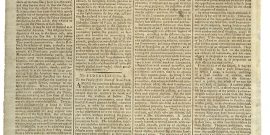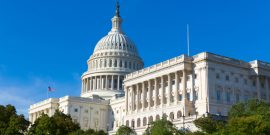Paul Finkelman’s account of antebellum decisions gets Justice Taney right, but not Justice Marshall, and especially not Justice Story.
The Virginians
Ratifying the U.S. Constitution in Virginia
The Philadelphia Convention rent Virginia’s political elite as no event ever had. Not only had Patrick Henry refused his proffered seat (he said he “smelt a rat”), but two of the three delegates who stayed through the whole Convention before finally refusing to sign were Virginians.
And not just any Virginians. Non-signer Edmund Randolph, the Old Dominion’s governor at the time, had served virtually throughout the Convention as chief advocate of the Virginia Plan, which the delegates knew as “Randolph’s Resolutions.” Perhaps even more significantly, Virginian politicos generally recognized George Mason as their state’s leading constitutional authority. He had taken the lead in drafting both the Virginia Constitution of 1776—the first written constitution adopted by the people’s representatives in the history of the world—and the Virginia Declaration of Rights, the first American declaration of rights. Mason refused to sign too.
Randolph explained his recusant posture by pointing to the several objections he had developed in the course of deliberations, and then saying that he intended to leave the question open until the people of his home state had an opportunity to express their sentiments. Mason, characteristically more forthright and less concerned with popular opinion, made no secret of the fact that, as James Madison put it, he “left Philada. in an exceeding ill humor indeed.”
As if that weren’t bad enough, Madison found proof on hurrying to resume his duties as member of the Confederation Congress of still further opposition within the Virginia political elite: both Congressman Richard Henry Lee and Congressman William Grayson, each a sometime president of Congress, agreed with Mason and Randolph that the Constitution ought to be amended before it was ratified.
The elections to the Virginia Ratification Convention to be held in Richmond the following June augured no better for the Federalist cause. It seemed that the Virginia elite, uniquely among the states’ political establishments, was split more or less down the middle. Madison would have the aid of Edmund Pendleton, George Nicholas, Henry Lee, and John Marshall, while Mason and Henry would be joined by James Monroe at the head of the group Mason called “republicans”—but whom historians have joined Federalists in calling “Antifederalists.”
After the governor published a pamphlet laying out his objections to the Constitution, many believed that Randolph would take the lead among Antifederalists. For us, however, able as we are to read James Madison’s mail, it is clear that there was never much chance of that. Madison succeeded in persuading his younger friend that he must not.
The Richmond Convention opened with Pendleton’s election to preside over the proceedings. (George Washington, president of the Philadelphia Convention, declined to participate.) In his acceptance speech, Pendleton noted the high honor of representing “a Great people [note: not one of thirteen parts of one great people], the Citizens of Virginia.” Through the balance of the Convention, numerous Federalists, Antifederalists, and undeclared delegates alike would assume that the Virginians were a discrete people, the federal relationship a convenience.
As he had in Philadelphia the year before, Governor Randolph made the first significant speech. Things had changed since he refused to sign the Constitution, he said: eight other states’ ratifications left no practical possibility that the Constitution would be amended before the requisite nine states agreed to it. Since the choice therefore now lay between union under the unamended Constitution and no union at all, he favored immediate ratification. Amendment must come later. Although he would argue throughout the Convention that the Constitution bore many imperfections, Randolph was a Federalist at last.
To George Mason, this made Randolph “young Arnold.” Patrick Henry mocked Randolph so severely so many times, saying that Henry had learned his skepticism of the Constitution from Randolph and asking portentously why Randolph had changed his mind, that Randolph ultimately sent a second to converse with Henry’s second about the terms of a duel.
As the convention unfolded, a regular pattern developed: Henry, ignoring the rule that provisions of the Constitution should be considered one after the other, from Article I through Article VII, ranged across the entire Constitution hunting for vague and/or capacious language whose enactment would threaten Virginians’ liberty. He also followed Antifederalists in other states, not to mention Mason’s objections and Randolph’s pamphlet, by highlighting the omission of a bill of rights. Mason, Monroe, Grayson, and a few others occasionally chimed in, but Henry was by far the most loquacious delegate in the convention.
In response to Antifederalist warnings, a handful of Federalists, particularly Randolph, George Nicholas, and Madison, laid out in calm, reasoned tones the case for the Constitution. Chief among their contentions were that the Articles of Confederation had proven unworkable, a bill of rights could be added as soon as the new Congress met, and the “sweeping clauses” which vexed Henry weren’t really sweeping.
According to ex-governor Henry, far the Revolution’s most powerful orator, the General Welfare and Necessary and Proper Clauses amounted to general grants of power to Congress. The new government’s legislature would be able to do ’most anything, Henry said. That must have been what the Philadelphia Convention intended, or else it would not have rejected Mason and Randolph’s demand that a bill of rights be included in the Constitution.
It was Governor Randolph who gave the dispositive response to this argument. Congress, he said, would have only the powers that were “expressly” granted. As Madison explained, the Necessary and Proper Clause added no power, but merely reflected a principle that would have been implicit even if that language had been omitted.
Antifederalists did not buy the Federalist assurances, however. Henry had noted several times that Virginia’s delegates had gone to Philadelphia charged with proposing amendments to the Articles of Confederation, and here they were arguing for adoption of an entirely new constitution. How could they be trusted?
Here Nicholas chimed in:
If thirteen individuals are about to make a contract, and one agrees to it, but at the same time declares that he understands its meaning, signification and intent to be, what the words of the contract plainly and obviously denote; that it is not to be construed so as to impose any supplementary condition upon him, and that he is to be exonerated from it, whensoever any such imposition shall be attempted—I ask whether in this case, these conditions on which he assented to it, would not be binding on the other twelve? In like manner these conditions will be binding on Congress. They can exercise no power that is not expressly granted them.
Marshall, Randolph, Pendleton, and Madison had all made exactly the case expressed in Nicholas’s last sentence here at various points in the convention. In doing so, they echoed the most famous Federalist argument of all: Pennsylvania statesman (and Framer) James Wilson’s speech in Philadelphia soon after the Philadelphia Convention’s conclusion. (Despite our current tradition, The Federalist was narrowly circulated outside New York City. Wilson’s speech, on the other hand, was discussed in numerous states’ ratification contests.)
Randolph wrote that he knew delegates whose “scruples” had “been quieted” by these assurances. Soon after, the convention rejected a motion to seek amendments before ratifying, 88-80, and then ratified the Constitution, 89-79. Depending how many delegates’ scruples Randolph meant, it may be that Nicholas’s argument accounted for the four-vote margin of Federalist victory over Antifederalists’ program of delaying ratification until there had been amendments. In either event, the ideas that the Federal Government had only the powers “expressly” granted and that Virginia remained a party to a compact would form the bedrock of Virginia constitutionalism for decades to come—with momentous consequences.


